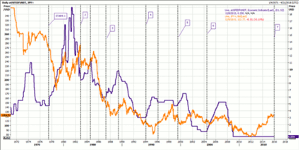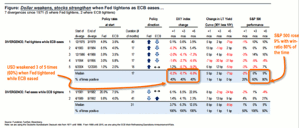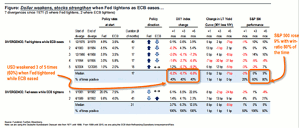Given that the Federal Reserve is expected to raise interest rates on Wednesday for the first time in nine years, currency analyst Kathy Lien,of BKForex.com, maps out five reasons why selling the US dollar could turn out to be a smart play.
Daily FX Market Roundup December 14, 2015
For the first time in nine years the Federal Reserve is expected to raise interest rates and selling US dollars could be the smartest trade. Most investors would normally look to buy a currency ahead of a rate hike, but in the case of the Fed, their well-telegraphed decision could mean more losses for the greenback. We have already seen investors bail out of their long USD/JPY and short EUR/USD trades as EUR/USD peaked in mid November and USD/JPY bottomed in early December, and with only a few more days to go before the historic announcement, there’s very little chance of a strong pre-FOMC dollar rally. Everyone who wants to be long dollars ahead of the rate decision is probably long already with more traders moving to the sidelines as the big day nears.
There are a number of reasons why the dollar could fall after the Fed hikes even though US rates will move higher at a time when many other major central banks have taken steps to drive their rates lower. Here are five specific reasons for selling the dollar after this week’s rate decision:
1. Not Every Fed Hike Means a USD/JPY Rally
Here’s a chart that one of our readers helped us compile overlaying the Fed Funds rate with USD/JPY. As you can see, not every Fed hike after a long period of pause coincides with a dollar rally. In many cases USD/JPY rallied before the rate hike but failed to extend its move thereafter.
2. Dollar Weakened 3 out of Last 5 Times Fed Tightened When ECB Eased Periods
In the last 45 years, there were five Fed tightening cycles that began when the ECB was easing. Three out of those five times—or 60% of the time—the dollar index weakened. Here’s some stats compiled by Tom Lee from Fundstrat:
NEXT PAGE: 3 More Reasons the Dollar Could Fall
|pagebreak|3. Rate Hike Will Be Accompanied by Dovish Statement
One of the main reasons why the dollar tends to be performs poorly after the first hike is because its oftentimes accompanied by a dovish statement. Given the historic significance of the decision and the current economic environment, the Fed will go out of their way to ensure that the market realizes that they will normalize monetary policy gradually in the coming year. Inflation remains extremely low, global demand is weak, and the US recovery is slow. This is not the time for rapid rate rises and the Fed cannot afford a sharp spike in rates. They have already started to downplay the significance of the first hike and emphasize the importance of the overall policy path. Recent US economic reports—including last week’s retail sales—numbers were mixed, reinforcing the central bank’s need to move slowly.
4. Mean Reversion
It is not unusual and oftentimes expected that mean reversion would occur after strong moves. There was significant dollar strength in 2015 and as the main event that has motivated these trades pass—mean reversion—which is a fancy way of saying a correction is expected.
5. Yearend Flows
Finally, with yearend approaching, more investors will be looking to take profits, go flat, and reassess their positions after this year’s moves. The dollar’s gains in 2015 will also force investors and funds to rebalance their portfolios and this process will involve selling dollars.
Is there any chance that the dollar could rally post FOMC? Yes.
If the Fed surprises the market by suggesting that they could raise interest rates again in the first quarter, the dollar could rise on renewed expectations for Fed tightening. The market is pricing in two to three more rounds of tightening next year so this possibility is not inconceivable.
Also, just because the dollar could fall post FOMC does not mean that it won’t rally at all in 2016. This year’s ECB and Fed rate hike expectations expire with the December rate decision but if EuroZone growth slows, the euro rises too rapidly, or the US economy gains momentum, forcing the ECB or Fed to act again, monetary policy divergence could renew the uptrend for the dollar.
By Kathy Lien, Co-Founder, BKForex.com













